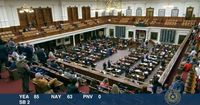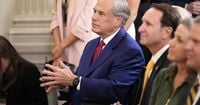In a significant shift in educational policy, the Texas Legislature passed a controversial school voucher bill on April 17, 2025, marking a pivotal moment in the state's educational landscape. The bill, which creates a $1 billion private school voucher program, has drawn both fervent support and strong opposition, reflecting deep divisions among lawmakers and the public.
Texas now joins at least 15 other states that have implemented some form of taxpayer-funded vouchers for private education. The passage of this bill has been a top priority for Governor Greg Abbott, who has long advocated for school choice as a means to provide parents with more educational options for their children. However, critics argue that such programs destabilize public education and disproportionately benefit private and often religious schools.
The Texas House of Representatives voted 85-63 in favor of the voucher program in the early hours of April 17, after an extensive 11-hour debate. Only one Republican, former House Speaker Dade Phelan, sided with Democrats in opposing the bill. Earlier, Democrats had proposed an amendment to put the voucher program to a statewide vote in November, but it was rejected, highlighting the contentious nature of the legislation.
“Today, the Texas House of Representatives betrayed the children of Texas,” stated Charles Foster Johnson, executive director of Pastors for Texas Children, a leading opponent of the vouchers. He described the bill as a "reckless subsidy program that rips public dollars out of our neighborhood schools and hands them to unaccountable private institutions." Johnson criticized the legislation as a scheme that fails to support the poorest children and violates the Texas Constitution by using public funds to support religious education.
In stark contrast, Governor Abbott hailed the bill's passage as a triumph for parents seeking more educational choices. “This is an extraordinary victory for the thousands of parents who have advocated for more choices when it comes to the education of their children,” he said in a statement following the vote. Abbott emphasized that he would sign the bill into law as soon as it reaches his desk, positioning Texas as a leader in educational reform.
The voucher program is designed to allocate funds for families with children in prekindergarten through 12th grade, allowing them to apply for money to cover educational expenses. Under the program, families could receive $10,000 per year for private school tuition, $2,000 for homeschooled students, and up to $30,000 for students with disabilities. The funding for the program is capped at $1 billion for the first two years, with priority given to low-income families and those with disabled children.
Despite the support from many Republicans, the bill has faced significant backlash. Critics argue that the program could siphon essential funding from public schools, which have already been struggling to meet the needs of their students. In a related move, the Texas House also passed a near-unanimous measure to increase public school funding by about $8 billion, which includes salary raises for teachers and an increase in per-student funding for the first time since 2019.
“Are we really willing to trade an efficient system of public, free schools that serve all children for an inefficient system of private, expensive schools that will only serve a privileged few?” asked Rep. Chris Turner (D-Grand Prairie), voicing concerns about the long-term implications of the voucher program.
The political maneuvering leading up to the bill's passage has been intense. After previous attempts to pass similar legislation failed, Abbott and his allies targeted conservative legislators who opposed vouchers during the 2024 primaries, successfully replacing them with proponents of school choice. This strategy has underscored the growing influence of wealthy donors in shaping educational policy in Texas.
President Donald Trump also weighed in on the debate, reportedly calling Republican lawmakers to express his support for the school choice initiative. His involvement highlights the national implications of Texas’s educational policies, as they could set a precedent for other states considering similar measures.
As the bill moves forward, it will require further reconciliation between the House and Senate versions, particularly concerning the specifics of funding allocations and eligibility criteria. The final legislation is expected to head to Abbott's desk soon, where it is poised to become law.
The Texas Republican Party celebrated the passage of the voucher program, framing it as a necessary step towards expanding educational opportunities for families across the state. In contrast, Texas Democrats criticized the legislation, labeling it as "welfare for the rich" that fails to address the needs of the majority of Texas students, particularly in rural areas where private school options are limited.
As the debate continues, the future of public education in Texas hangs in the balance. Proponents of the voucher program argue it will empower parents and enhance educational choices, while opponents fear it will undermine public schools and exacerbate existing inequalities in the education system.
In the coming weeks, as lawmakers work to finalize the details of the voucher program, the voices of parents, educators, and community leaders will be crucial in shaping the discourse around the future of education in Texas. The outcome of this legislation will not only impact the state's educational landscape but could also influence national conversations about school choice and public funding for education.









